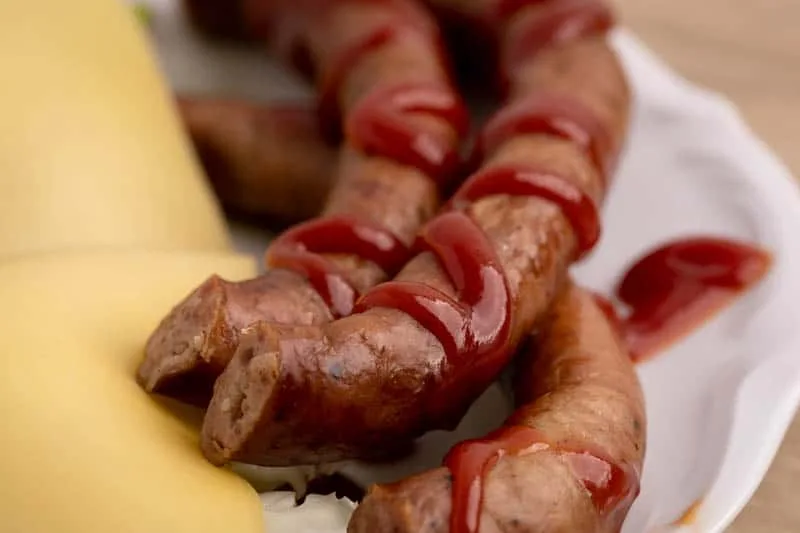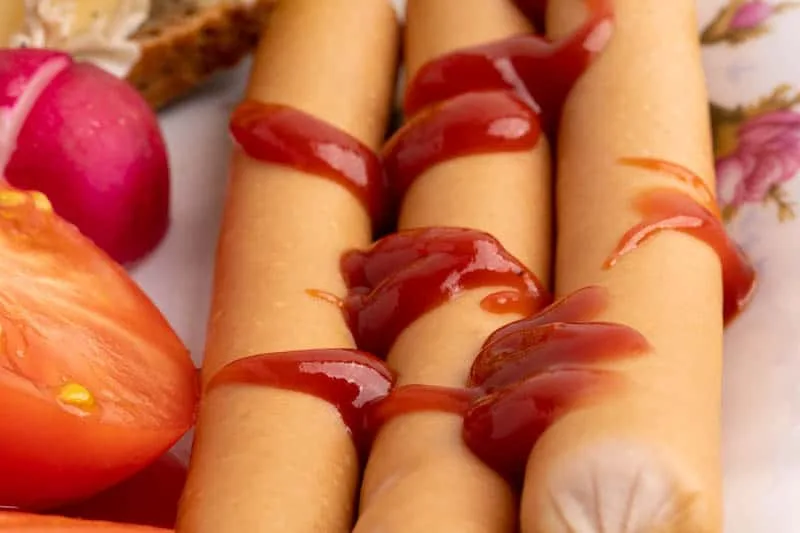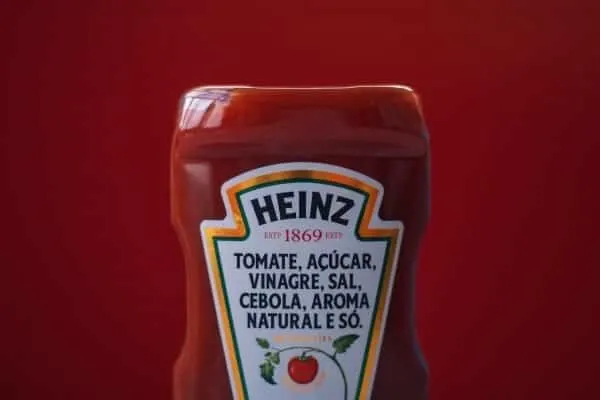If you don’t use ketchup all that often, each bottle stays open for at least a couple of months, if not more. Can ketchup go bad?
Most of us buy big bottles of ketchup and use very little at a time.
If you’re like me and use yours roughly two or three times a month, that bottle you’ve just opened will sit in storage for the next four or five months, at least.
And at a certain point, you’ll start wondering if it’s still safe to eat, and how long is ketchup good for.
If that sounds familiar, this article is for you.

How To Tell If Ketchup Is Bad
Look for the following when checking if your ketchup is still okay to eat:
- Mold. While mold growth is unlikely due to presence of natural preservatives such as vinegar, it’s still possible. Check both the surface and the cap of the bottle.
- Sour or yeast-like smell. An off smell is a sure sign the ketchup is spoiled.
- Bloated bottle or an unusual popping noise when opening the bottle. If the bottle sat untouched for a long time and now either of these is present, your ketchup is off.
- Off taste. If the signature somewhat sweet taste of ketchup isn’t there anymore, it’s gone.
Those are the signs of spoiled ketchup.

There are, however, a couple of other changes that people mistake for ketchup being spoiled.
The first of them is separation.
As ketchup ages, the vinegar and other liquid will begin to separate out from the tomato paste in the condiment. You’ve likely experienced the beginning stages of this when you go to squeeze out some ketchup, and find a splash of liquid instead.
A little separation is fine, and can be shaken back together, but eventually, the liquid will separate out too much to be mixed back in. That’s when you throw it out.
The second one is darkening.
As ketchup continues to age, the color will begin to darken. Similar thing happens to a few other condiments, like BBQ sauce and Tabasco.
When you notice your ketchup darkens, pay close attention to its quality (e.g., give it a taste before splashing it on a hot dog).

How Long Does Ketchup Last?
You can store unopened ketchup for up to a year past the date on the label. Once you open the bottle, it keeps for at least a couple of months (up to a year, depending on the quality and when you open it) in the fridge.
Because of the acidity of the tomatoes and vinegar, and the amount of sugar, ketchup (or catsup) has a pretty long shelf life. And while each bottle comes with a date, it’s a best-by date, not an expiration date.
The shelf-life of an unopened bottle of ketchup is quite long because as long as it’s unopened, there’s not that much bad that can happen to it.
Once you unseal the ketchup, the condiment gets access to fresh air. That makes it possible for any bacteria to start multiplying (if they can survive in such an acidic environment).
Because of that, 9 out of 10 times open ketchup stays safe for months, though it doesn’t necessarily taste as good for such a prolonged period.
If your ketchup that’s open for a few months doesn’t taste as good as it used to, consider discarding it and opening a new bottle. Even if it’s still well within its date. Also, think about buying smaller containers to avoid food waste.
Please note that all of that is true for most store-bought bottles of ketchup produced by big brands like Heinz. They last a long time even after opening.

But if you’ve bought ketchup from a smaller manufacturer that only uses all-natural and organic ingredients, those rules don’t always apply.
Such condiments often last only for a couple of months, and stay safe to use for a much shorter period after opening. If you have one of these, make sure you check the label for details.
Last but not least, homemade ketchup.
The ketchup that you make yourself has a far shorter shelf life, remaining good for about two to three months in the refrigerator. That time span depends on the ingredients, so check with your recipe for details.

How to Store Ketchup
Keep unopened bottles of store-bought ketchup in a cool, dark place, away from heat or direct sunlight.
Once the bottle is opened, you should refrigerate it to maximize shelf life. Of course, you can leave it at room temperature, but it keeps quality for only a month this way, instead of 6 to 12 months.
Homemade ketchup should also be stored in the refrigerator, in a tightly sealed container.
When using a utensil to get ketchup out of a glass bottle or jar,make sure it’s clean.
Be careful to keep the bottle cap clean, to prevent contamination and possible mold growth. Simply wiping any buildup off of the cap, and making sure it’s dry before replacing on the bottle should be enough to keep contamination at a minimum.
If you tend to store ketchup for a really long time, consider storing it upside down to retain quality for a bit longer.

Can You Freeze Ketchup?
While ketchup technically can be frozen, in most cases, there’s no need to do it.
Think about it. The bottle should last for at least half a year (if not longer) after opening, so you have plenty of time to finish it.
But if you really need store that ketchup for a longer period, feel free to freeze it.
The best option will probably be freezing the condiment in an ice cube tray. This way, you can defrost only a cube or two as needed, and let the rst sit in the freezer until you need them.

Frequently Asked Questions about Ketchup
While ketchup comes with a date on the label, it doesn’t expire on that day or month. That date is there for quality purposes, and more often than not your ketchup will be fine for months after that date. You can eat it as long as it doesn’t show any signs of spoilage I described earlier.
It’s impossible to tell. It should stay okay for at least half a year, but often keeps for a few years assuming that it’s unopened. Give that expired ketchup a check before pouring it on your sausages or adding to hot dogs, though.
Summary
- Unopened ketchup lasts for up to a few months past the date on the label. Once you open the bottle, it usually retains quality for at least a few months and stays safe even longer.
- Discard ketchup if there’s mold, it smell sour or yeast-like, or the taste is off.
- Darkening and some separation are fine, but make sure to check if taste is still good enough.
- Unopened ketchup can sit at room temperature. Once you open the bottle, refrigerate it to retain the best quality for longest.